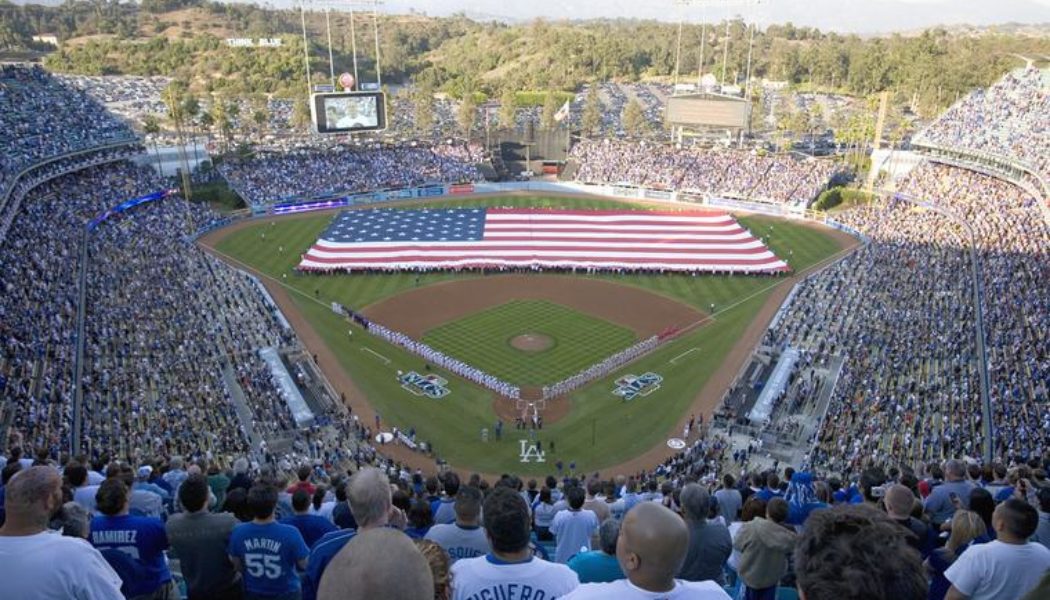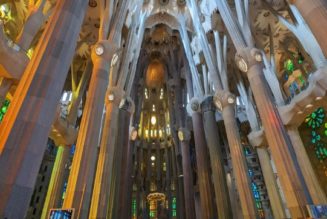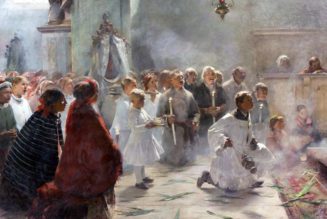
One of the reasons baseball is America’s pastime is it usually exists far outside of contentious debates, political rancor and cultural divides. At least that’s how it’s supposed to be. But that image has come crashing down at the iconic Dodger Stadium in Los Angeles.
The controversy has been centered for some weeks now on the Dodgers’ June 16 celebration of “Pride Night.”
The existence of such Pride Nights and other celebrations of LGBTQ activities and agendas is profoundly flawed, as the Church makes clear via its teachings about the truth and meaning of human sexuality. Not only that, but the elevation of pride is the exact opposite of our calling as disciples and imitators of Christ. It’s no coincidence that the day the Dodgers decided to honor the first of the deadly sins, the Church bids us to celebrate the Solemnity of the Most Sacred Heart of Jesus, a constant symbol of the power and victory of humility.
The Dodgers’ Pride Night should make Catholics uneasy in and of itself. But the controversy truly started when the team decided to honor that night the anti-Catholic drag group known as the “Sisters of Perpetual Indulgence” with what the Dodgers called the “Community Hero Award.”
The Sisters of Perpetual Indulgence aren’t just a group that publicly disagrees with Church teachings on marriage, God’s creation of male and female, and traditional sexual morality. It is a group that proactively mocks Catholics and attempts to desecrate the sacred. Members of the group ridicule the purity and piety of religious sisters by dressing up as grotesque caricatures of nuns. They promote sexualized depictions of Our Lord, Jesus Christ. And they’ve reportedly even welcomed very young children into events where obscene sexual exhibitionism was on display.
After public outrage at the Dodgers’ decision to honor the Sisters of Perpetual Indulgence — including pushback from several U.S. bishops, professional baseball players and prominent political leaders such as Sen. Marco Rubio of Florida — the Dodgers appeared to back down. They disinvited the group, not for putting children at risk or for holding up sinister mockery of the one in five Americans who identify as Catholic, but because their invitation could, in their words, “distract from the great benefits that we [the Dodgers organization] have seen over the years of Pride Night.”
It would be bad enough if the story ended there, but in less than a week, the Dodgers caved. The team re-invited the group and issued a groveling apology.
“We are pleased to share that [the Sisters of Perpetual Indulgence] have agreed to receive the gratitude of our collective communities for the lifesaving work that they have done tirelessly for decades,” the Dodgers wrote. “In the weeks ahead, we will continue to work with our LGBTQ+ partners to better educate ourselves … and use our platform to support all of our fans who make up the diversity of the Dodgers family.”
Presumably supporting the “fans who make up the diversity of the Dodgers family” doesn’t include the roughly 5 million Catholics in the Archdiocese of Los Angeles or the fanbase across the United States drawn from America’s nearly 62 million Catholics. Nor have we Catholics received a promise that the Dodgers organization would “better educate” themselves about anti-religious bigotry or even apologize for twice insulting our faith.
Following the reinvitation, Bishop Robert Barron of Winona-Rochester, Minnesota, formerly an auxiliary bishop of Los Angeles, called for a boycott against the Dodgers.
“The Los Angeles Dodgers have made it clear to Catholics and all people of goodwill that they think mockery of the sacred beliefs of the Catholic faith is something that they support and will reward with honors and commendation,” Bishop Barron said. He continued, “It’s not enough for the Catholic laity to experience a catharsis because a bishop has spoken up about this; they need to take action to let the Dodgers organization know that their position is not just disappointing, it is unacceptable.”
Boycotts, such as the one Bishop Barron proposes, can be effective in sending a message. The boycott responding to Bud Light’s promotion of gender confusion drove down beer sales substantially; in one week, purchases of Bud Light plummeted nearly 30%, compared to the same period the year before. Likewise, retailing giant Target removed some LGBT merchandise from its shelves and shifted “Pride” displays in a few stores to less prominent locations following an outcry from the public.
But are boycotts enough? Bud Light’s sales have dropped, but in his public statement about the matter, the CEO of Budweiser parent company Anheuser-Busch gave a non-apology, merely saying that “we never intended to be part of a discussion that divides people.” Likewise, it’s good that families aren’t being so aggressively bombarded with Pride advertising the moment they walk into Target. However, when stocking its pride collection, Target still partners with a brand that produces Satanic-themed clothes. Boycotts can hurt the profit margin and thus correct some behavior, but by themselves they don’t seem to lead to a change of heart, or even a real understanding of why we are offended.
To that end, on June 12, the U.S. Conference of Catholic Bishops issued a statement calling on Catholics to pray and make an act of reparation on June 16, the Solemnity of the Sacred Heart.
Signed by Archbishop Timothy Broglio of the Archdiocese for the Military Services, USA, the president of the USCCB, and Cardinal Timothy Dolan of New York, chairman of the USCCB’s Committee for Religious Liberty, and Archbishop José Gomez of Los Angeles, the statement said, “It has been heartening to see so many faithful Catholics and others of good will stand up to say that what this group does is wrong, and it is wrong to honor them. We call on Catholics to pray the Litany of the Sacred Heart on June 16, offering this prayer as an act of reparation for the blasphemies against our Lord we see in our culture today.”
Another incomplete attempt to address this problem is the push for organizations to be more accepting of religious perspectives as a part of “diversity” campaigns. Brian Grim’s Religious Freedom and Business Foundation conducted a study, noting that some companies are making strides to be more inclusive of religion and of religious people. That may be helpful, but it’s also not enough. Ironically, Target is No. 13 on their list of most religiously inclusive U.S. Fortune 500 companies. This underscores a fundamental tension: You can’t be inclusive of Christians and celebrate those who hate Christianity at the same time.
We can see this with the Dodgers. It’s not enough that the Dodgers hosted a “Catholic night” in 2016 or hastily announced a “Christian Faith and Family Day” scheduled for this July, as if that somehow balances out their Pride Night honoring an anti-Catholic group. This kind of inclusion is a sham. Organizations like Target or the Dodgers are free to promote “Pride” and lose fans, money and credibility in the backlash that follows. But what they are not entitled to do is claim they support Catholics while embracing hate-filled, toxically anti-Catholic organizations under the guise of “diversity” or in the name of the “charity” work the group claims to do.
Inclusivity may be good in certain contexts, but when inclusion is imposed as an ultimate standard, it implies the relativistic falsehood that all groups and ideas are equally legitimate and equally acceptable.
When it comes to the Sisters of Perpetual Indulgence and the Church they mock, there is no comparison. Real nuns like Mother Teresa’s Missionaries of Charity have a decades-old legacy of bringing Jesus’ healing and love to those who identify as members of the LGBTQ community. Church outreaches like Courage and the Eden Invitation help those who have LGBTQ attractions and profess the Catholic faith to embrace the fullness of Christ’s vision for their lives. While mock “sisters” promote in the most grotesque and demeaning ways the unsatisfying pursuit of self-indulgence, real sisters give of themselves daily as they work side by side with those who are marginalized.
The Catholic faith offers hope, belonging, forgiveness, love and happiness more than any embrace of pride ever could.
This is what we want the Dodgers — and the world — to see. Boycotts and religious-inclusion initiatives might raise awareness. They may correct some particularly bad excesses. But real transformation requires the understanding and application of fundamental Christian principles that put truth over inclusion and self-giving over self-indulgence.
For the Dodgers, that means they must not merely include Catholics or institute moderate changes to their behavior, but instead offer true contrition for the offense of promoting anti-Catholic bigotry.
Ironically, we’re only asking the Dodgers for what they were so quick to give the sacrilegious drag queens: an apology, a commitment to learn why what they did was wrong, and the promise to do better.
God bless you!









